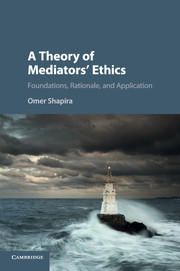Book contents
- Frontmatter
- Dedication
- Contents
- List of figures
- List of tables
- Preface
- Abbreviations of codes of conduct
- PART I A theory of professional ethics
- PART II A theory of mediators’ ethics
- PART III Dealing with ethical problems
- Appendix I A proposed model code of conduct for mediators
- Appendix II Model standards of conduct for mediators (2005)
- Bibliography
- Index
Appendix I - A proposed model code of conduct for mediators
Published online by Cambridge University Press: 05 March 2016
- Frontmatter
- Dedication
- Contents
- List of figures
- List of tables
- Preface
- Abbreviations of codes of conduct
- PART I A theory of professional ethics
- PART II A theory of mediators’ ethics
- PART III Dealing with ethical problems
- Appendix I A proposed model code of conduct for mediators
- Appendix II Model standards of conduct for mediators (2005)
- Bibliography
- Index
Summary
The Proposed Model Code of Conduct for Mediators (Proposed Code) is the end product of the theory of mediators’ ethics. It builds upon codes of conduct for mediators adopted in Anglo-American countries, including the United States, Canada, and Australia. The Proposed Code reflects in its Standards the minimum ethical norms of conduct that mediators in Anglo-American societies are expected to observe.
Introduction
Mediation is a process in which a third person – a mediator – assists parties to an actual or potential conflict in maintaining a dialogue in order to enable them to make decisions regarding the conflict and reach an agreement when they wish to do so. The provision of mediation services is a social interest: mediation enables people to engage in dialogue and address disagreements on a consensual basis, absent state or individual coercion, and with savings of both private and public resources. Moreover, mediation promotes a better society based on dialogue, social harmony, and agreement.
The purpose of the Proposed Code is to –
(a) Inform mediators about the Standards of conduct for mediators and offer guidance for conducting mediation;
(b) Inform mediation parties about the mediation process, their rights and obligations while participating in mediation, and the obligations and rights of mediators in conducting mediation;
(c) Enhance public confidence in the mediation process and profession.
The Proposed Code is aimed at supplementing, not replacing, legislation, case-law, court rules or other professional rules of obligatory force applicable to mediators.
The Proposed Code Standards include different levels of guidance:
(a) Obligations – the Standards state the duties of mediators, using the terms “shall” and “must” to indicate actions that mediators have to take or refrain from taking.
(b) Permissions – the Standards use the term “may” to indicate actions that mediators are permitted to take or refrain from taking. Professional discretion must be exercised on the basis of relevant considerations and good reasons that can be reasonably justified.
(c) Aspirations – all duty-imposing Standards indicate ideals (as well as obligations) that call for the realization of each Standard beyond its compulsory threshold. The ideal feature of the Standards corresponds to excellence in ethical conduct that exceeds the demands of duty; a goal accomplished by excellent mediators committed to the highest level of ethical conduct. Mediators are encouraged to reach that ethical bar but cannot be criticized for failing to do so.
- Type
- Chapter
- Information
- A Theory of Mediators' EthicsFoundations, Rationale, and Application, pp. 397 - 411Publisher: Cambridge University PressPrint publication year: 2016

